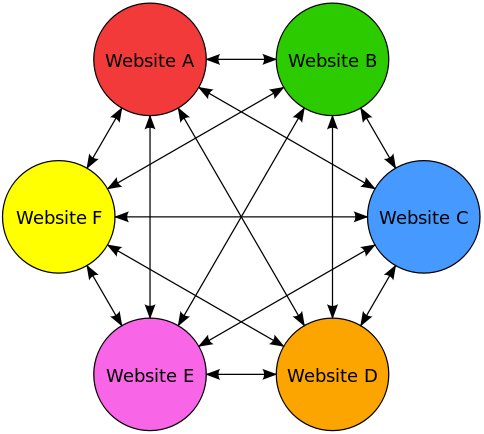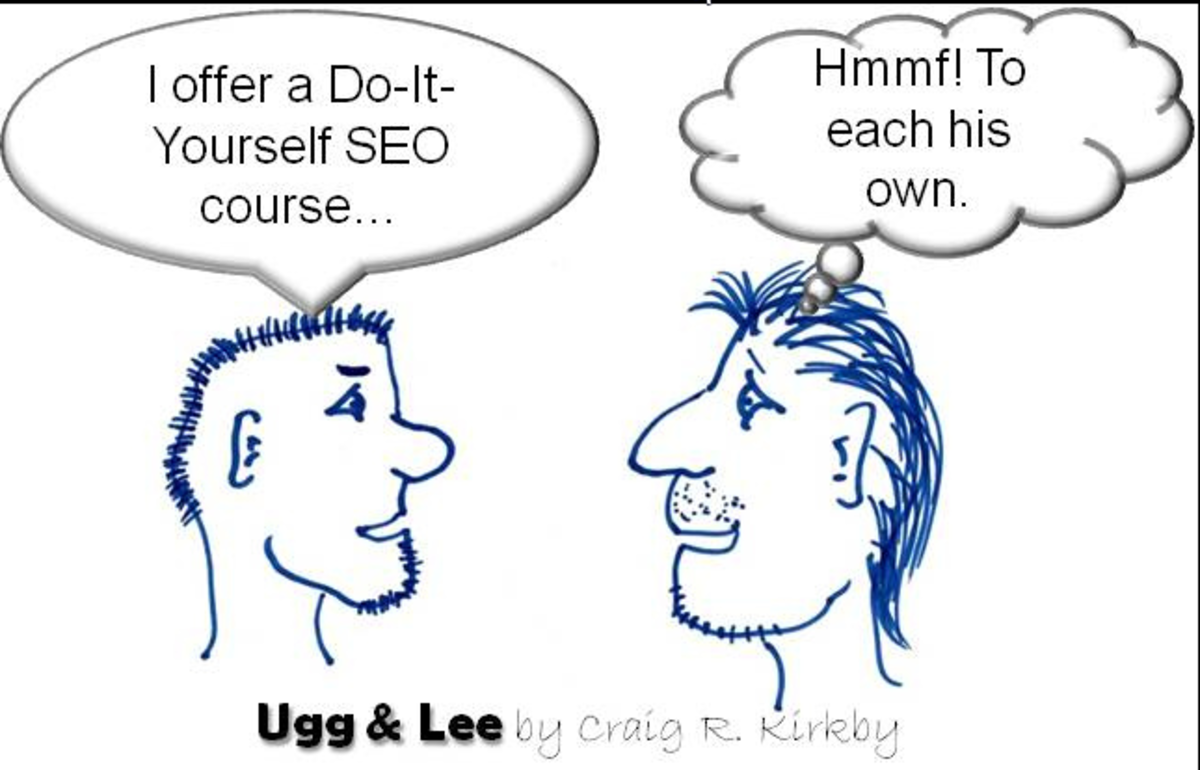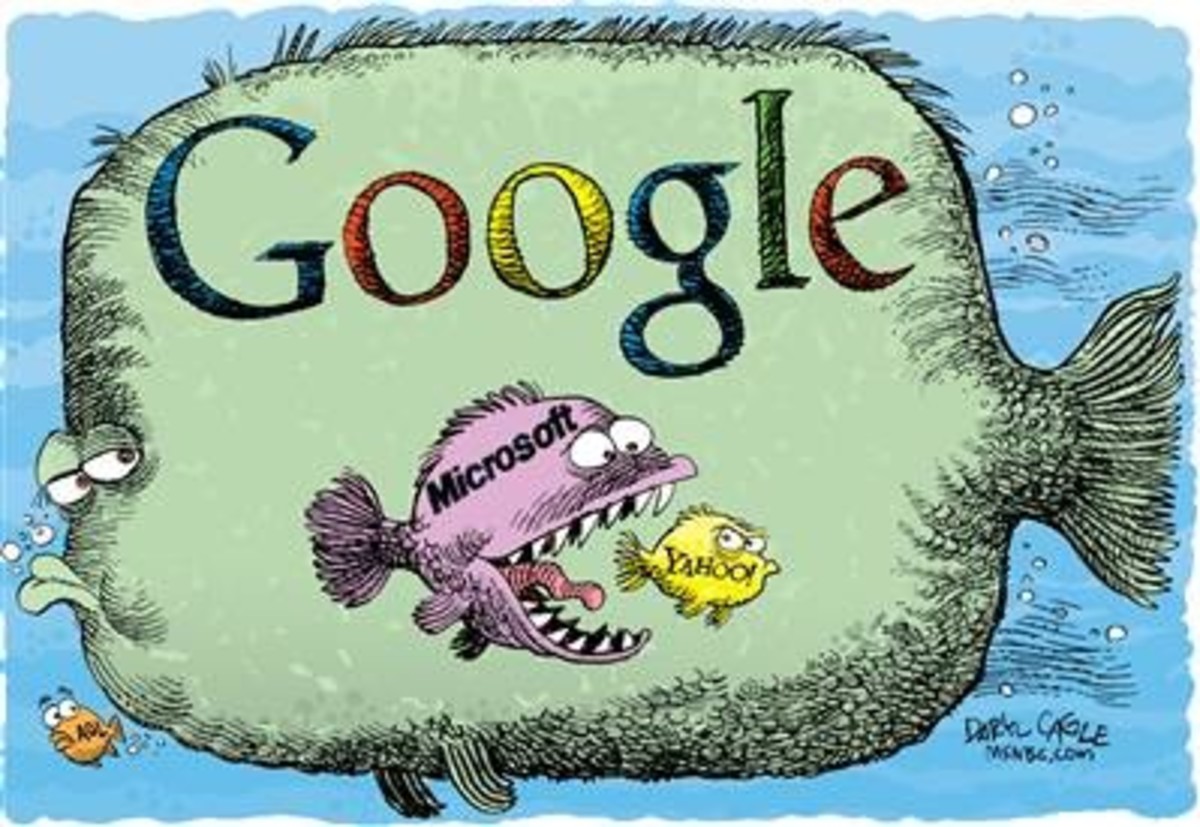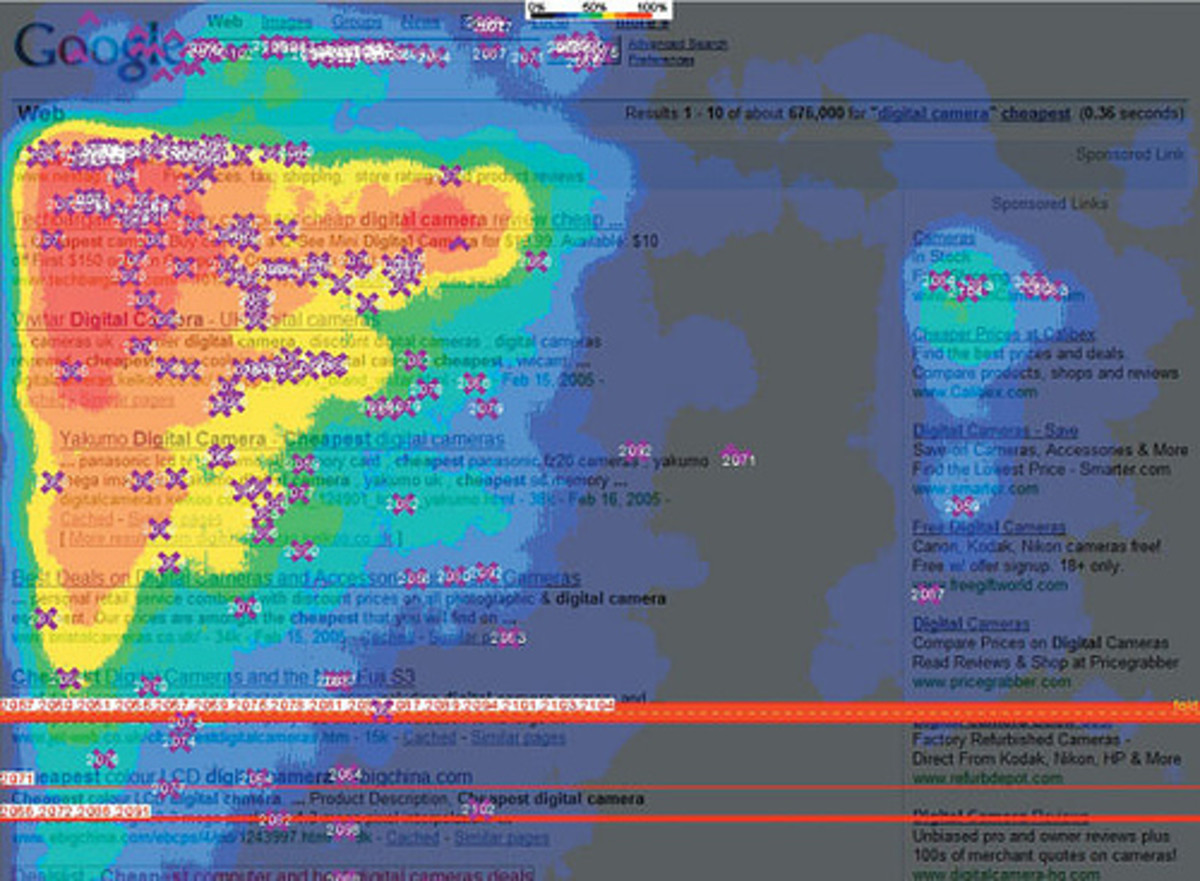SEO Skills
Build it and they will come - Um... No!
When the internet was in its infancy there were no websites, instead everything revolved around Bulletin Boards and the small communities they encouraged, when the first websites as we would vaguely recognise them started to appear it really was a case of “Build it and they will come!”; those days have long gone.
What is SEO?
SEO is the technique of improving your websites position within the search engines rankings such that you have a steady stream of visitors who arrive at your site naturally (organic traffic) and is best performed by utilising a range of techniques that comply with the rules of the main search engines.
The paragraph above is not a definition but rather a plain English description of SEO as it is best understood today.

FYI: How Google Displays the Results
The picture above is of search results on Google for “music downloads”.
The red circles are highlighting Google Adwords Advertisements. These are Pay Per Click results, the ones in the main search column to the left cost more and there are often up to three of these adverts before the first organic result shown in the green circle.
Typically 10 results are shown per page and these days directories and similar sites often rank better because so many pages have not been SEO’d.
Organic results high on page one are what every SEO Professional really wants for their client but these are the hardest to achieve as we will soon see.
SEO techniques
The techniques used in SEO can be separated into two main categories, on-page and off-page SEO.
These techniques directly affect the websites ability to rank well on search engines, on-page SEO work is technical at it's core and although off-site techniques are less technical, failing to understand how the current algorithm of a particular search engine works will make the difficulty of ranking anywhere from harder to impossible.
Your Search Engine of Choice
Which search engine do you usually use?
On-Page SEO
On-Page SEO techniques typically involve enhancing search engine descriptive parts of the code that makes up the webpages which together make up the website.
The title of the webpage, the description of the page, content headings, and the content itself all form part of SEO. In days gone by, the Keywords Meta Tag was one of the keys to success, but after the amount of abuse this suffered over the years the main search engines no longer. (Check out the video below).
That is not to say the keywords are not important, they are, it’s just that we don’t have to declare them to be effective any more, instead we focus on using those keywords and many variations of them within the content without affecting the value of the content to the reader.
Sound complicated or difficult? To create effective content that ranks well - it is!
Matt Cutts - Google Software Engineer
Off-Page SEO
This is where SEO providers spend the majority of their time after the On-Page bit is sorted. Off Page SEO really is the most time consuming part of the process. What’s more, it can’t be hurried.
It involves (but certainly is not limited to):-
- Website submission
- Blogging
- Forum Posting
- Community Creation in Social Networking Sites
- Directory submission
- Link Exchange (if done badly this can get you banned from Google)
- Social Bookmarking
- Link Baiting
- Photo Sharing
- Video Promotions
- Article Submission
- Classifieds Submission
- Press Release Promotion
- Local Listings & Yellow Pages
- Business Reviews & Testimonials
- Sharing Documents
- RSS Directory Submissions
- Pay Per Click campaigns
- Mobile App creation
- Answers (Yahoo Answers and similar resources)
Here’s the killer – Do too many of these too quickly will have a negative impact on ranking a site. Doing too much of any one of these within a short space of time will also have a negative impact.
In truth, this is where SEO providers earn their money. It is also why they charge the fees they do. Just imagine having to write an article that meets criteria that are so specific, so highly tuned and crafted that every heading, every picture and every table or chart has a significant impact on the results.
Video has become popular on websites but, it is no longer enough to have a video within a page or article; the video needs to be original and by the author to score maximum points!
The way that articles are so fantastic is that good content will encourage the reader to visit the authors’ website. But if you try to promote or sell a service or product within that article and include links to pages that deal directly with that product or service, then the article may be deemed spam!
SEO professionals don’t make the rules, the search engines do, the rules are not published in detail but the guidelines on what is acceptable and unacceptable are published. The rules change frequently and SEO professionals have to work out the effect of the changes before applying them.
For SEO professionals it is like walking a tight rope in the dark without a balancing pole.
It’s not all Black and White
Within this discussion, I have been referring to the “rules” and I have just explained that these are derived from guidelines. Following the guidelines and adhering to the spirit of the guide lines is often referred to as White Hat SEO. Doing the opposite and using any technique to cheat the system is usually referred to as Black Hat SEO.
There is however, a Grey Hat SEO as well, this is for techniques that if used in abundance or in high frequency would be classed as Black Hat, but when used carefully and sparsely they may enhance SEO and improve rankings.
Personally I try very hard to avoid Grey and definitely stay away from Black Hat activities.
Link Farms

Example Link Farm
A link farm these days is usually an automated process for generating HTML links to and from other websites of a similar nature but better rank than the target site. So if in the diagram above Website A was the site for which you wanted to enhance it’s SEO then the diagram shows how a link farm would create a sequence of links.
If all the other websites (B through F) have a better Page Rank then the theory is that Website A’s page rank will be raised.
The problem is that in the diagram above there is a complete circle or wagon wheel, these days that will almost guarantee no benefit will be gained and is likely to get you banned from Google or if you are lucky just put in the Sand-Pit.
The other problem is that these Link Farm sites are often nothing more than poor quality directories and once they have been attacked by hackers or Black Hats for their own purposes Google and other Search Engines ban them causing your own website rankings to plummet.
Page Rank
I have used the term Page Rank a number of times but what is it?
According to Google in a revived article “Facts about Google and Competition”:
PageRank works by counting the number and quality of links to a page to determine a rough estimate of how important the website is. The underlying assumption is that more important websites are likely to receive more links from other websites.
http://web.archive.org/web/20111030064534/http://www.google.com/competition/betteranswers.html
The calculation is probably a bit more complex than that and is part of an algorithm named after Larry Page (hence Page Rank) it has nothing directly to do with your position in search results, but is a factor in determining that position.
Notice the rather woolly term “number and quality of links” this is where Google determines what is important and therefore considered as quality.
We understand that part of determining quality is that the link should come from another page that discusses a similar or related subject and that the number of words on that page should be in excess of 300 and also that the content should be considered important indicating that the author is an authority on the subject.
Remuneration for SEO – A price worth paying?
If you have nothing better to do for the next year or so, you could probably take some courses, study everything you can lay your hands on in the way of books, video and other research material and at the end of that time you should be able to get your website ranked reasonably well.
Will you get your website to page one of Google?
Perhaps!
Look, imagine that you or an SEO Professionals client is a plumber. Go to your web browser, visit Google and do a search for Plumber and you will get results similar to the picture below.
Search Results for Plumber

continued...
What this means is that you are asking to be ranked in the first 10 organic results out of 54 Million web pages that Google has indexed as being relevant to the search term “plumber” and you probably expect to be number one!
If you were to be a bit more realistic and search for “plumber xxxxx” where xxxx is your local town, then the number of results is going to be reduced dramatically and there is a good chance that the top organic result won’t have a brilliant page rank.
As a result trying to rank well locally is much more achievable. But still a complex task, just remind yourself of the 20 off-page items I listed earlier (that is a partial list by the way).
So why is it that when you need a plumber because you have a leak and there is water going everywhere or that you have a problem with your heating system in the winter you are happy to pay them £100, £200, or even £400 to have the problem fixed?
It probably took the plumber 40 minutes to get to you, the problem was diagnosed and resolved within a couple of hours and your heating is on again.
But, when you get to work and you realise that your website isn’t showing up on the first page of Google for “Your Trade” in “Your Town” you balk at the idea of paying say £100 a month to an SEO professional who is going to keep you on page one and if you are lucky get you to the number one organic slot?
That SEO guy is spending 10 hours or more a month promoting your website safely within mysterious guidelines and providing you with reports about the positive work that he or she is doing for you on a regular basis.
That SEO guy probably went to university to study for 2 or 3 years and then completed numerous courses that cost over £1000 each for between 2 and 5 days of information, he or she has to study continually to update their skills and keep them current for around £10 an hour from you!
Now I’m not saying that plumbers don’t have to study and work hard – I have friends who are plumbers and I know how hard they have worked to get their business to where it is today, but even they understand that SEO is worth more per hour than they get paid.
Next time you look at getting some SEO work done on your website, remember how much work is involved, understand that the results will never be instant unless they Pay Per Click or they are exploiting some Black Hat techniques that will get you banned.
Pay those guys on time and with a smile because they really are miracle workers.
What we charge - to give you an idea
Service/Program
| Starter
| Business Pro
| Ultimate
|
|---|---|---|---|
Search Engine Submission
| Yes
| Yes*
| Yes*
|
Full Site Analysis
| Yes
| Yes
| Yes
|
Adwords Campaign
| No
| No
| Yes
|
On-Page
| Yes
| Yes
| Yes
|
Off-Page
| No
| Yes
| Yes
|
Contract Length
| 3 Months
| 2 Years
| 2 Years
|
New website at 2 Yrs
| No
| Yes
| Yes
|
Monthly Reports
| Yes
| Yes
| Yes
|
Payment Type
| 50/50
| Monthly DD
| Monthly DD
|
Typical Cost
| £380 + VAT
| £80 + VAT
| from £160 + VAT
|
* = If required
| |||
50/50 = Half up front half on completion
|
Conclusions
Obviously we can't speak for other companies, but their price structures may well be very different.
Some will charge more and maybe you will get amazing results, but I can guarantee one thing, with SEO you usually get what you pay for.
As you may have gathered from the 20 part numbered list above, Off-Site SEO is a time intensive process, there are no short cuts that can be done without the risk of putting your site in a sandbox.
It is not beyond the scope of most people to take on Pay Per Click (PPC) advertising like Google AdWords, but you are going to pay through the nose for the benefit of the service and unless you select the right keywords you will not appear in the right places at the right times.
It is worth remembering that with PPC when you stop paying - you stop getting traffic to your site.
If you need on-page and off-page SEO then paying monthly will ensure that when search engines change their algorithm, you will get the necessary work done to maintain your ranking. What's more with (he says with an unashamed plug for his own companies services) our service your website gets re-designed and takes advantage of the latest developments every 2 years.
As a business owner you have to decide where your marketing budget is going to be spent. In all honesty, most companies spend more than £100 per week on local newspaper adverts; so paying that same amount for global reach or at least everyone who is on-line and searching in your county is far cheaper and far more cost effective.
Next time you hear how much it costs for SEO, remember, you are not having your boilers annual service, in effect you are having a resident plumber watching it all the time! How much would that cost you?








